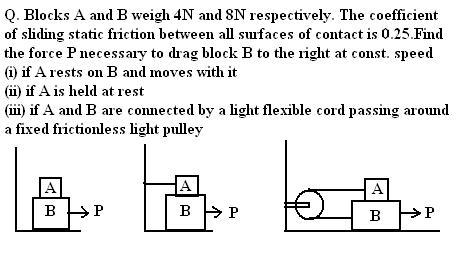 1
1I CAN TELL U IN WORDS(PLZ TRY TO UNDERSTAND....AS KEYS NOT WORKING).
U NEED TO MAKE FBD OF BOTH.IN FBD OF B THERE WUD BE FRICTION DUE TO A N DUE TO GROUND TOWARDS LEFT.SO FOR CONSTANT VELO. NET ACCELERATION SHOULD BE ZERO.
SO,FRICTION(BLOCKS)+FRICTION(GROUND)=P
I.E. P=SIXTEEN NU=FOUR N
GOT IT??????
 1
1ASHISH,DID U GET IT???????????
 1
1man............reply????????????????/////
 1
1dude read ques. properly.where is it mentioned that A shud go with constant velocity!!!!!!!
 1
1u kept thread name correct-- it seems ive forgotten even laws of motion :((......u really have forgot LOM[1]
 1
1first one i think john answered
for the second one the block A if kept intect will face kinetic friction as then there will be relative motion
thus we have
P-4μ-(4+8)μ=0
thus P=16μ
for the third one see that if B moves to the right then A will move to the left and thus there will be again kinetic friction ..
and as B will move with constant velocity it will face kinetic friction in the bottom surface too
further as B will move with constant velocity A will to and thus both will remain in equillibrium
thus we have T=4μ
P=T+4μ+(4+8)μ
 1
1but the first one should have answer as 3N
 106
106rohan for first Q,
Consider a force P=4 N acts on B
then consider the forces on A
IT is 1 N towards the right and hence its acceleration is 1/0.4 = 2.5m/s2 hence the block A will slip over B and friction will cahnge direction and act backward on A and forward on B .. So, then B will again acclerate (it wont go with constnat velocity)
I was thinking to take A and B as the whole system...
If u do that then P=3N which i think is valid.. Consider that P=3.000001 N then accleration of B is very little (A will provide only 0.000001 N towards left) and similarly dut to the very little force acting on A it wont slip on B ..
which one is correct?
 1
1as i mentioned P=3N ...
it is because as B will move with constant velocity A also has to as it doesnt slip on it
so the friction acting on A should be zero thus P=μ(4+8)=3N
 106
106yes i too got the same answers as urs but strangely answers are given as 4,5,7 N respectively.. nyways thx
 1
1so you havent forgotten laws of motion ... :)
 1
1[3][3][3][3][3][3]
surely NEWTON will suicide after reading this justification for 3N
i haven't forgot LOM.ans. is 4N only.
 1
1so,the correct ans. are
1.4N
2.4N
3.5N
 106
106correct ansers are 3N, 4N and 5 N
